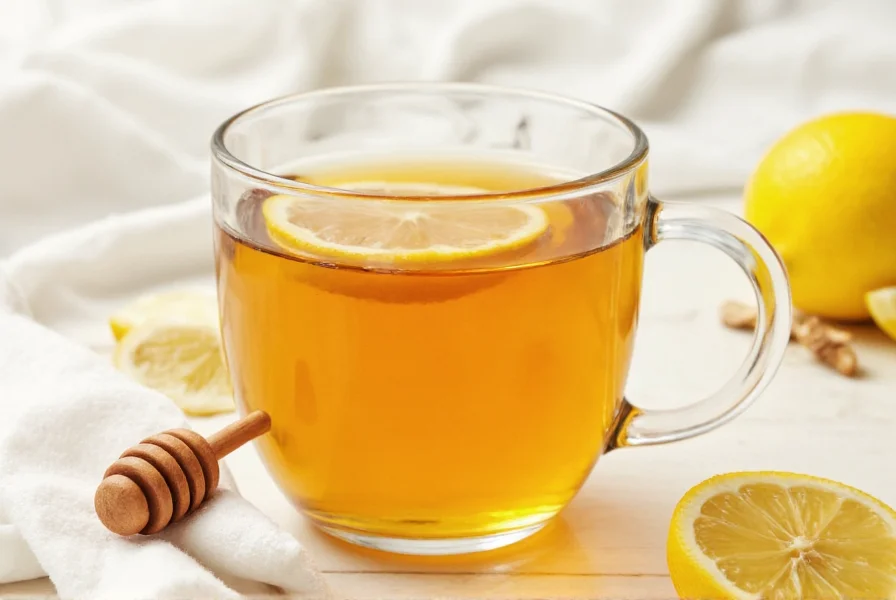When you're searching for natural ways to boost your daily wellness routine, lemon ginger honey tea stands out as a time-tested beverage with multiple health advantages. This simple combination of three natural ingredients creates a powerful synergy that supports various bodily functions. Unlike many trendy "miracle" remedies, the benefits of this tea are backed by scientific research on its individual components and their combined effects.
Key Health Benefits of Lemon Ginger Honey Tea
Understanding the specific health benefits requires examining how each ingredient contributes to the overall effect. Let's explore the science behind this popular wellness beverage.
Immune System Support
Lemon provides a significant dose of vitamin C, which plays a crucial role in immune function. One medium lemon contains about 31mg of vitamin C, contributing to your daily recommended intake. Ginger contains gingerol, a bioactive compound with potent antioxidant and anti-inflammatory properties. Honey, particularly raw varieties, contains antimicrobial compounds that help fight pathogens. When combined, these ingredients create a beverage that supports your body's natural defense mechanisms.

Digestive Health Improvement
Ginger has been extensively studied for its digestive benefits. Research published in the World Journal of Gastroenterology confirms ginger's effectiveness in accelerating gastric emptying and reducing symptoms of indigestion. The warm liquid base of the tea also helps stimulate digestive enzymes, while lemon's citric acid supports liver function and bile production. Many people find that drinking this tea 20-30 minutes before meals improves their digestion significantly.
Inflammation Reduction
Chronic inflammation underlies many health conditions, and the compounds in lemon ginger honey tea help combat this issue. Gingerol in ginger inhibits inflammatory pathways in the body, while lemon's flavonoids and honey's polyphenols provide additional anti-inflammatory effects. A study in the Journal of Medicinal Food demonstrated that ginger supplementation reduced markers of inflammation in participants with osteoarthritis.
| Ingredient | Key Compounds | Primary Health Benefits |
|---|---|---|
| Lemon | Vitamin C, flavonoids, citric acid | Immune support, antioxidant protection, digestion aid |
| Ginger | Gingerol, shogaols, zingerone | Anti-inflammatory, nausea relief, pain reduction |
| Honey | Polyphenols, hydrogen peroxide, methylglyoxal | Antibacterial, cough suppression, wound healing |
Sore Throat and Respiratory Relief
This tea combination provides natural relief for sore throats and respiratory discomfort. Honey's thick consistency coats the throat, reducing irritation, while its antimicrobial properties help fight infection. Ginger's anti-inflammatory effects reduce throat swelling, and lemon's acidity can help break up mucus. The warm temperature of the tea provides additional soothing relief. Research in the Cochrane Database of Systematic Reviews confirms honey's effectiveness for cough and cold symptoms, particularly in children over one year old.
How to Prepare Lemon Ginger Honey Tea for Maximum Benefits
While commercial versions exist, preparing lemon ginger honey tea at home ensures you get the maximum health benefits without unnecessary additives. Here's a simple preparation method:
- Boil 1-2 cups of filtered water
- Add 1-2 inches of fresh ginger (sliced or grated)
- Simmer for 10-15 minutes (longer for stronger ginger flavor)
- Remove from heat and add the juice of half a lemon
- Let cool slightly (to preserve honey's beneficial enzymes)
- Add 1-2 teaspoons of raw honey
The best time to drink lemon ginger honey tea depends on your health goals. For digestion, consume 20-30 minutes before meals. For immune support, morning consumption works well. Before bed, it can help soothe nighttime coughs and promote relaxation. Avoid drinking it too hot, as extreme temperatures can degrade some beneficial compounds.

Important Considerations and Limitations
While lemon ginger honey tea offers multiple benefits, it's essential to understand its limitations and potential concerns:
- Dental health: The citric acid in lemon can erode tooth enamel over time. Drink through a straw or rinse your mouth with plain water afterward.
- Blood thinning: Ginger has mild blood-thinning properties. Consult your doctor if you take blood-thinning medications.
- Honey precautions: Never give honey to children under one year due to botulism risk.
- Acid reflux: Some people with GERD may find the lemon aggravates symptoms.
- Not a cure-all: This tea supports wellness but shouldn't replace medical treatment for serious conditions.
Research on lemon ginger honey tea specifically is limited, as most studies examine the ingredients individually. However, the collective evidence supporting each component's health benefits suggests this combination provides meaningful wellness support when consumed regularly as part of a balanced lifestyle.
Conclusion
Lemon ginger honey tea represents a simple, natural approach to supporting daily wellness. Its benefits for immune function, digestion, inflammation reduction, and respiratory health make it a valuable addition to many people's routines. By understanding both the science-backed advantages and the reasonable limitations of this beverage, you can incorporate it effectively into your wellness strategy. Remember that while this tea offers multiple health benefits, it works best as part of an overall healthy lifestyle that includes balanced nutrition, regular exercise, and adequate sleep.
Frequently Asked Questions
How often should I drink lemon ginger honey tea for optimal benefits?
For general wellness, 1-2 cups daily provides optimal benefits without potential side effects. Many health professionals recommend consuming it in the morning for immune support or before meals to aid digestion. Consistency matters more than quantity - regular daily consumption yields better results than occasional large amounts.
Can lemon ginger honey tea help with weight loss?
While not a weight loss solution, this tea can support healthy weight management. Ginger may slightly increase metabolism and promote feelings of fullness, while replacing sugary beverages with this low-calorie option reduces overall calorie intake. The tea works best as part of a comprehensive approach including balanced nutrition and regular exercise, not as a standalone weight loss remedy.
Is there a difference between using raw honey versus processed honey?
Yes, raw honey contains more beneficial enzymes, antioxidants, and potential antibacterial properties compared to processed honey, which is often pasteurized and filtered. Raw honey maintains its natural composition, while processed versions may lose some therapeutic compounds during heating and processing. For maximum health benefits in lemon ginger honey tea, raw, unprocessed honey is recommended, added after the tea has cooled slightly to preserve its beneficial properties.
Can I drink lemon ginger honey tea if I have diabetes?
People with diabetes can enjoy this tea with modifications. Reduce the honey amount or use a smaller quantity of a lower-glycemic sweetener like stevia. Ginger may actually help with blood sugar regulation according to some studies, but the honey content requires attention. Consult your healthcare provider about appropriate honey quantities in your specific dietary plan, as individual responses to carbohydrates vary.
How long do I need to steep ginger for maximum benefits?
For optimal extraction of ginger's beneficial compounds, steep fresh ginger in boiling water for 10-15 minutes. Longer steeping (up to 20 minutes) creates a stronger, more potent tea with higher concentrations of gingerol. If using dried ginger powder, 5-7 minutes is sufficient. Avoid boiling ginger for extended periods (over 30 minutes) as this can degrade some beneficial compounds while increasing bitterness.











 浙公网安备
33010002000092号
浙公网安备
33010002000092号 浙B2-20120091-4
浙B2-20120091-4